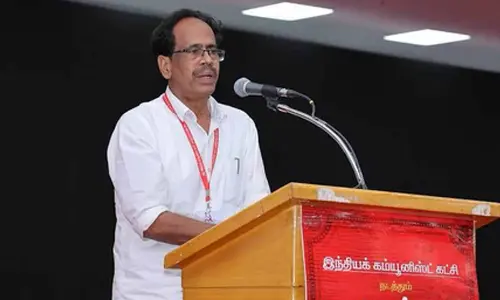Gabbar Is Back: Too loud and formulistic

Gabbar Is Back: Too Loud And Formulistic. Anarchical solutions to corruption are worrisome. Our responses to social evils have invariably hovered around the heroics of an individual and thus suggestive of the fact that the common man can hardly stand up and change the system.
.jpg) Anarchical solutions to corruption are worrisome. Our responses to social evils have invariably hovered around the heroics of an individual and thus suggestive of the fact that the common man can hardly stand up and change the system. Add to this is the latest offering from Bollywood – a loud remake of a Tamil film of Murugadoss. You know even if remotely initiated that a Vijaykanth film is not for the connoisseurs. However, you also hope that Akshay Kumar will salvage this too. He nearly does.
Anarchical solutions to corruption are worrisome. Our responses to social evils have invariably hovered around the heroics of an individual and thus suggestive of the fact that the common man can hardly stand up and change the system. Add to this is the latest offering from Bollywood – a loud remake of a Tamil film of Murugadoss. You know even if remotely initiated that a Vijaykanth film is not for the connoisseurs. However, you also hope that Akshay Kumar will salvage this too. He nearly does.
The film has a short prologue that tells you how we worship those who are heroes even at the cost of the law. Our protagonist Gabbar (Akshay) is but a Prof in Physics but goes about handing over instant justice by kidnapping corrupt revenue officials in Maharashtra and even awarding a death penalty to some. The script details his mechanics and how he relates the social action to physics and obviously there is a hello to the action as the victims are those who are corrupt.
Built completely around the star value and the heroics of the aging Akshay we have the entire film telling us that there is large scale corruption in our society and how we will have to fight it. The paradox is that the hero goes about it in a manner that is in itself a hue of corruption. Corruption is after all not just the sums collected. We have a tale of medical corruption and how the social activist goes about making public the heinous practices in the profession. Generalisations apart, the manner of offering a solution is so simplistic and cinematic that you know that it is one more of those wafer thin platitudes that only help in inoculating you and making you a tad more insensitive to the cause.
However, it is arguably no part of the filmmaker to go about finding solutions or even going about changing social order. What is tiresome is when platitudes are thrown at you in the name of entertainment and a holier than thou spirit is suffocating dished out.
Filmmaker Krish obviously has to redeliver what Murugadoss had earlier given the audience of the South. However, he relies very heavily on Akshay. The rest of the cast are just props walking in with half baked roles and a screenplay that does them collective and individual injustice.
Yet if the film holds together it is largely due to the manner in which Akshay Kumar. He yet again points to how he is arguably the most underrated star actor of our times. He does every unconvincing part of the story with a confidence that leaves you sympathetic for the guy. He is obviously mismatched with the far younger Shruti Haasan who in turn tries her best to add some meaning to her innocuous role. However, the film simply and brazenly revolves round Akshay Kumar. The final analysis depends largely on how you rate Akshay and not how good the film is. The repeated declaration that the tale is about a guy with the name of a villain but the actions of a hero is suggestively reflective of the contradiction of wanting to entertain but being caught up with a script hoping to change society.
The film points out two things very clearly. One that Akshay Kumar is a far better actor than he is credited to being and the second that Sanjay Leela Bhansali not only directs bad films but can also extend his skill sets of producing them.
Woman injured in stabbing attack in Tokyo, suspect at large
Bengal cop booked for murder over mysterious death of woman home guard, SIT to probe case
Staffer recalls horror of 7-kg gold robbery by armed gang in Karnataka’s Hunsur
25-Year-Old Airline Cabin Crew Member Dies At Gurugram Party; Police Begin Investigation














